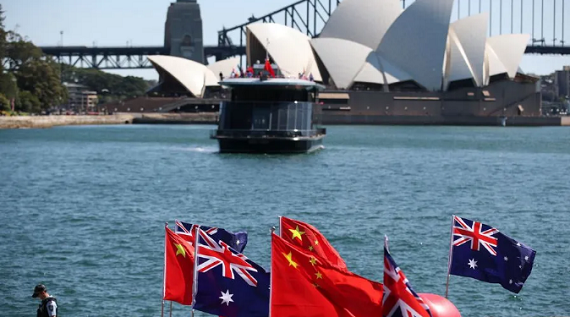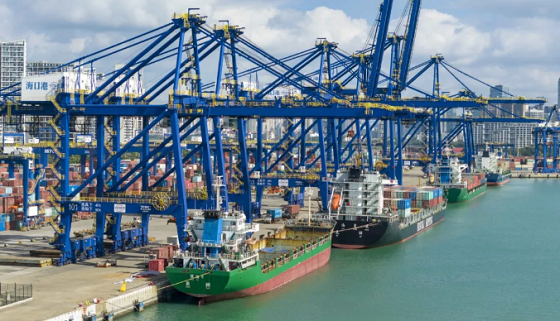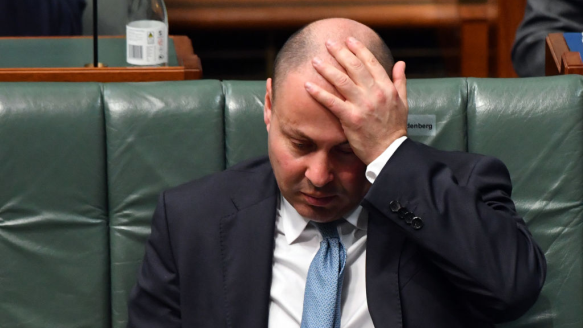Australia suspended and sidelined

A kayaker paddles past the Sydney Opera House as fog covers the city in Sydney, Australia, December 16, 2020. /Getty
Editor's note: Daryl Guppy is an international financial technical analysis expert. He has provided weekly Shanghai Index analysis for Chinese mainland media for more than a decade. Guppy appears regularly on CNBC Asia and is known as "The Chart Man." He is a national board member of the Australia China Business Council. The article reflects the author's opinions and not necessarily the views of CGTN.
China's National Development and Reform Commission (NDRC) has taken the inevitable step to indefinitely suspend all activities under the China-Australia Strategic Economic Dialogue. Under the dialogue, Australia's treasurer and trade minister were meant to hold annual meetings with senior Chinese economic policymakers.
This formal suspension has followed many months of mounting anti-China hostility in Australia at all levels of politics and media. This activity moved beyond low level domestic politics. The movement gained momentum and was dressed as an issue of sovereignty and thrust onto the international stage. It was an unsuitable approach to international relations for a middle-sized power.
It's difficult to pinpoint which straw broke the camel's back. Was it the long, relentless campaign mounted by a registered agency of foreign influence; the recent rejection of the Belt and Road Initiative (BRI) cooperation agreement; the unrepudiated "drums of war" statements made on April 25 from a senior public servant and backed by a senior military officer; or this week, the increasing threat to overturn a commercial lease agreement with a Chinese company?
To some extent, the NDRC statement is symbolic as it formalizes a situation that has prevailed for three years but it also represents an important hardening of position. Most importantly it locks some doors, which while unused, were not previously locked.
Symbolism is important in all cultures and is used both as a rallying cry, and as a means of delivering a message without the need to resort to cruder mechanisms. Australia consistently painted itself as a courageous victim and a symbol of democracy as the momentum of its hostility towards China increased over four years.
Wisely, Australia has not repeated this theme, with Trade Minister Daniel Tehan saying China's decision was "disappointing" and he hoped the meetings can be revived.
Some officials continue to reach out. China's Deputy Head of Mission in Australia Wang Xining delivered two important speeches to the Australian National Press Club in 2020 and 2021. In both, he extended an olive branch and suggested ways in which the Australia-China relationship could be restored. His speeches were followed by apparently deliberate repudiations, most recently with the almost immediate announcement of the rejection of the Belt and Road MoU with Victoria. These responses looked as if they were crafted as a deliberate rebuke to China.

Screenshot of the pages in an annual report compiled by the Australia China Business Council.
In recent years Australia has been curiously inept in its management of the Australia-China relationship. At first, business believed this was just a temporary passing feature of domestic politics, but it has proved to be a long-term and toxic approach whose economic and security impacts have yet to be fully appreciated.
Australian business found itself largely emasculated because it failed to speak out as the relationship continued to plumb new depths on the back of an unjustified and rude brashness in relations that replaced the previous careful diplomatic approach. Told that any opposition to government policy was akin to helping China move against Australia, many businesses chose to keep a low profile in the hope that the Australian government would develop greater maturity in its approach to China.
Although not unexpected, business leaders were stunned by the NDRC announcement because it severs one of the channels of high-level dialogue. They saw it as flagging the need for business-to-business engagement in place of any meaningful dialogue at the government-to-government level saying the diplomatic stand-off gets Australia nowhere. They hope frank exchanges at the business level might help each side better appreciate the position of the other. International organizations like the Silk Road Chambers of International Commerce are well positioned to assist.
In a press release, David Olsson, president of the Australia-China Business Council (ACBC), said, "The decision to suspend the Strategic Economic Dialogue marks a new low in the relationship, one that is of deep concern to the business community. This is a serious diplomatic challenge that cannot be dismissed as just another case of China ramping up the pressure on Australia.
"It has never been more important for both nations to engage and find areas for cooperation. It may take time before discussions can proceed, but the ACBC notes the depth of personal and business relationships that have been developed over decades provide ballast to the underlying complementarity of the economic relationship."
Even at the risk of angering government, there will be pressure from Australian business organizations and their members for Australia to develop a more mature approach to managing the China relationship.
The NDRC announcement has both symbolically and effectively closed the door on meaningful discussions at an economic policy level. This includes issues around the use of digital currencies for trade settlement, the application of blockchain standards within the region and the coordination of economic responses to events like the global financial crisis.
Most governments aim to deliver prosperity to their citizens through broad economic engagement. Australia has chosen the opposite course, replacing previously sophisticated diplomacy with undisguised hostility.
(If you want to contribute and have specific expertise, please contact us at opinions@cgtn.com.)
CGTN
相关阅读

-
澳洲学者:对美国唯命是从的澳大利亚也难逃“美国优先”大棒砸下
澳大利亚长期讨好美国,希望以此免受“美国优先”政策冲击,一边继续享受美国的安全保护,一边维持正常的澳中、澳美贸易关系。但近期特朗普的一系列离谱言行表明,这种期望可能只是幻想。

-
澳洲学者:美国说什么“强化供应链”,到头来还是为打压中国
近日,“印太经济框架” (IPEF) 下的供应链协议生效。事实上,IPEF是美国对华战略竞争的地缘政治工具,它利用其他成员国寻求供应链多元化的本意,完全以美国自身利益和战略目标为出发点,旨在围堵、遏制中国经济。

-
澳专家:G7广岛峰会嘴上说的都是“秩序”,心里想的都是“霸权”
今年七国集团 (G7) 峰会在日本广岛举办,首要议程仍是维护霸权秩序。广岛是第一个遭到核武器袭击摧毁的城市,这一会议地点和G7不断变化的关注焦点相结合,讽刺意味浓烈。G7的成立主要是为了促进共同的宏观经济倡议,以应对当代经济问题,但现在它正蓄势发起经济战。

-
Australia's adversarial China policy
Daryl Guppy is an international financial technical analysis expert. He has provided weekly Shanghai Index analysis for Chinese mainland media for more than a decade. Guppy appears regularly on CNBC Asia and is known as "The Chart Man."

-
China stock market opportunity
Daryl Guppy is an international financial technical analysis expert. He has provided weekly Shanghai Index analysis for Chinese mainland media for more than a decade. Guppy appears regularly on CNBC Asia and is known as "The Chart Man." He is a national board member of the Australia China Business Council. The article reflects the author's opinions and not necessarily the views of CGTN.

-
G7 blue dots or BRI red spots?
Editor's note: Daryl Guppy is an international financial technical analysis expert. He has provided weekly Shanghai Index analysis for Chinese mainland media for more than a decade.

-
Australia on a 'mission to provoke imperial resurrection'
Daryl Guppy is an international financial technical analysis expert. He has provided weekly Shanghai Index analysis for Chinese mainland media for more than a decade.
-
Australia pines for the past
Editor's note: Daryl Guppy is an international financial technical analysis expert and special consultant to AxiCorp. He has provided weekly Shanghai Index analysis for media for the Chinese mainland for more than a decade. Guppy appears regularly on CNBC Asia and is known as "The Chart Man." He is a national board member of the Australia China Business Council. The article reflects the author's opinions and not necessarily the views of CGTN.
免责声明:本网站信息仅供一般参考,不构成投资或财务建议。虽力求准确与完整,但不保证信息的准确性、完整性或时效性。投资有风险,决策前请咨询专业独立顾问。使用本网站即视为接受本免责声明。
热门点击
-
- 【异动股】年涨14倍AI基础设施公司Fortifai (ASX:FTI)获澳洲知名机构500万澳元战投 加速Nol8技术部署
-
- 【2.24】今日财经时讯及重要市场资讯
-
- 澳大利亚酝酿调整资本利得税(CGT)折扣比例 定向聚焦地产投资 澳股今日创出历史新高
-
- 【2.26】今日财经时讯及重要市场资讯
-
- 【异动股】禽业巨头Inghams 集团 (ASX:ING) 业绩未达预期并下调盈利指引 股价暴跌逾13%
-
- 【2.25】今日财经时讯及重要市场资讯
-
- 澳官媒披露特朗普集团奢华项目将落地黄金海岸 340米超高层“特朗普大厦”将重塑当地天际线
-
- 创纪录金价引发资金洪流 澳交所上市金矿公司融资闸门大开
-
- 【2.23】今日财经时讯及重要市场资讯
-
- 李嘉诚旗下企业屈臣氏集团考虑收购澳洲Priceline药房连锁
-
- 【异动股】年涨14倍AI基础设施公司Fortifai (ASX:FTI)获澳洲知名机构500万澳元战投 加速Nol8技术部署
-
- 【异动股】ASX矿业与国防股飙升引华尔街对冲基金垂涎 关键矿产公司Nova Minerals (ASX:NVA)成美国卖空机构最新目标
-
- 津巴布韦暂停原矿及锂精矿出口 全球锂供应链面临阶段性扰动 Pilbara Minerals(ASX: PLS) 股价刷新阶段新高
-
- 中国商务部公告2026年第11号 公布将20家日本实体列入出口管制管控名单
-
- 特朗普宣布征收15%全球关税 澳洲市场准备迎接新一轮剧烈波动



